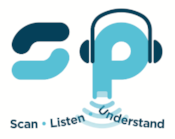The Success Story of Arran Smith –Empowered by Assisted Technology
This month I had the pleasure of talking to Arran Smith who was diagnosed with dyslexia at the age of nine. Today, at the age of thirty-five, he is a very successful businessman and is part of the growing team of dyslexic high flyers who have been recruited by GCHQ, Google, Apple and NASA.
Arran’s own experience of growing up with dyslexia has given him a personal insight into overcoming its problems and he has made a career of explaining to teachers, learners, trainers and business people how a disadvantage can be transformed into something positive when given the right kind of support and with the use of 21st century technology.
His formula for success:
1. Early Recognition
2. Good Support
3. Personal Determination
4. Resilience
5. Good Self-esteem
6. Assistive Technology
Arran has a reading age of nine, a spelling age of eight and has no automatic reading capability. He also grapples with elements of ASD, ADHD,and dyspraxia which make coping with dyslexia more complex. Fortunately for Arran, he developed a keen interest in technology at an early age and realised that it had the potential to help him capitalise on his talents. These crucial discoveries, and an ambition to communicate his ideas, have fired his relentless drive to help others.
When Arran’s dyslexia was diagnosed his parents were very supportive and were determined to secure that help he needed. He eventually received a Statement of Special Educational Needs and benefited from many hours of support from a dedicated teaching assistant. It wasn’t all plain sailing though. Arran can recall feeling anxious about his diagnosis even though he was relieved that it provided an explanation for his reading difficulties. However, knowing that he had dyslexia didn’t help with his feelings for frustration, confusion and anger and sometimes emotional distress. On one occasion a support worker told him that he would never amount to anything because he couldn’t read.
The effect of this remark was so profound that Arran has edited his learning experiences from that period of his life from his memory. However, it did provide the spur for his determination to prove his self worth.
At his senior school in Leicestershire, Arran was supported by an excellent SENCo and teaching team and met many positive influencers who made a huge difference to the path he was able to take. He received additional help from the Leicestershire Dyslexia Association and in due course took on the responsibility for coaching his dyslexic peers. He received an achievers award from the British Dyslexia Association and Rotary Club in recognition of his commitment to youth and community work. Arran still has strong links with his local community and is now the Chairman of the Leicestershire Dyslexia Association where he continues to raise awareness of dyslexia and support young people. More than anything else, Arran says that it was his parent’s positive attitude and the affirming influence of the Dyslexia Association, plus his own determination, that laid the foundations for his success. He is a founder of two companies, is an international speaker and advisor, and is a dyslexia consultant to Microsoft. What holds him aloft is his deep curiosity about his own learning needs and how he can adapt and use the resources around him to realise his ideas. He sees opportunities for projects everywhere and has an unrelenting drive to make technology work for him. He knows that finding the right tools, and receiving the right training, is vital.
Recognising a student’s individuality and building upon their strengths, rather than dwelling on their limitations, are key to building their self-esteem. Resilience is essential in order to cope with inevitable set-backs. Assistive Technology and Educational Technology tools are increasingly accessible, discreet, intuitive, and affordable. For example, Reading Pens that provides text-to-speech immediately.
Arran is a dyslexic adult who used a first generation Wizcom Reading Pen in school. He tells us that it has played an important part in building his self esteem, independence and positive learning outlook. Scanning Pen technology is now sleeker, smarter, more ergonomic, more accurate, and has much more functionality than when Arran was using it in school. These pens are supporting thousands of students towards greater self esteem and giving the opportunity for them to view themselves as capable learners who thrive with assistive technology. How brilliant is that!
Here are some great words of advice from Arran on assistive technology.
“Good technology should help learners to become independent. Matching the technology to a student’s difficulty and training them to use that technology is time well spent. Well-considered technology is empowering because it opens the door to independent learning and supports self-confidence. It should raise achievement and enlightenment - because it brings an understanding that you can actually do something you might have thought was beyond your capabilities.”
Ending on a really positive note, it is fantastic that, at last, we are seeing attitudes change towards recognising the unique strengths of visual, spatial, and lateral thinkers who also happen to have dyslexia.
